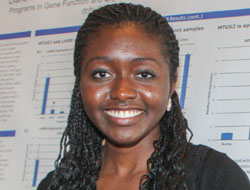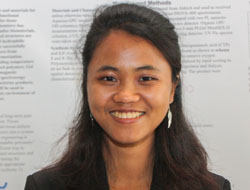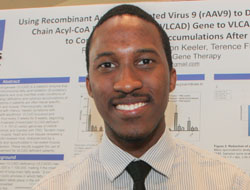More than the state’s only public medical school, UMass Medical School is a world-class research institution that attracts distinguished faculty, postdoctoral fellows, graduate students—and, in the case of the Summer Undergraduate Research (SUR) Fellowship Program, undergraduate students—to Worcester from far and wide.
This summer, the SUR welcomed 34 high-achieving students from colleges and universities in 14 states, Puerto Rico, Guam and Canada. While here, they underwent a 10-week immersion in the real world of research, learning together in structured classes and lectures as well as conducting sophisticated experiments using state-of-the-art equipment and techniques in laboratories across campus.
Sponsored by the Office of School Services, SUR is designed to attract students who are disadvantaged, disabled or from a group that is underrepresented in biomedical research. The program provides participants with in-depth exposure to actual scientific research and introduces them to the excitement, challenge and creativity of the enterprise in order to convince them to consider research in the sciences as a viable career option. Each student conducts hands-on laboratory research with principal investigators serving as mentors, role models and advisors.
Students are funded by either the National Institutes of Health (NIH) or the UMMS Office of Research. This year as in recent ones, SUR has also hosted students funded by the Exceptional Research Opportunities Program (EXROP) of the Howard Hughes Medical Institute (HHMI).
Among this summer’s class were:
- Diane Fru, a rising junior at Iowa State University majoring in psychology and minoring in genetics. An HHMI EXROP honoree, she worked in the laboratory of HHMI Investigator Michael Green, MD, PhD, the Lambi and Sarah Adams Chair in Genetic Research and professor of molecular medicine. Fru is a native of Cameroon, Africa, who immigrated to Chicago with her family.
- Rising Berea College senior and chemistry major Grace Par, who worked in the laboratory of Jie Song, PhD, assistant professor of orthopedics & physical rehabilitation and cell & developmental biology. The oldest of four children, Par came from Burma to Tennessee in 2004 to be reunited with her parents, political refugees who had fled the country earlier.
- Roshawn Johnson, who will be a junior at Columbia University this fall, and who worked in the laboratory of Terence R. Flotte, MD,the Celia and Isaac Haidak Professor in Medicine and professor of pediatrics. Johnson grew up in Jamaica and completed his secondary education there before he and his immediate family came to the United States to join their extended family three years ago.
UMassMedNow (UMMN): What sparked your interest in biomedical science?

Diane Fru
Diane Fru: As a child in Cameroon I was exposed to a lot of sickness because my mom is a nurse and a lot of people came to her seeking medical help. I grew up always wanting to be in the health care field, but research wasn’t anything that I thought about at all until college, when I did my first medically related research in a cell biology lab. I loved that experience.
Grace Par: My family and high school teachers inspired me. My grandmother was a nurse, which is like a doctor in Burma. People came to our house for help, and I wanted to be like her. I wasn’t exposed to science until I came to this country, when my primary interest in caring for people expanded to an interest in the science behind it. It was hard at the beginning because I was missing a lot of basic science, but with help from my teachers, I was able to catch up.
Roshawn Johnson: My parents always told me to be a doctor because it is one of the most highly esteemed professions in Jamaica. Fortunately, I found that I like science and am good at it.
UMMN: What is it like to be a college student in a distinguished investigator’s laboratory?

Grace Par
Fru: I was so nervous and didn’t know what to expect. When I came in, I had a project right away and I was responsible if my cells died, if things were or weren’t going as planned. Having your own project makes you feel connected to your work. I felt like I was a PhD student.
Par: Working in a lab is so different from learning in class—we have to think ahead, ask questions. There are no wrong answers. The lab is very organized, so from my very first day, I was able to get a lot of data and learn a lot.
Johnson: It made me a better researcher. Now I definitely want to continue doing research as a physician. I now want to see what it’s like to create an experiment of your own—I want the full experience.
UMMN: What has been a highlight during your time here?

Roshawn Johnson
Fru: The lecture by Dr. John Sullivan [professor of pediatrics and microbiology & physiological systems and pathology] about his role in developing a drug to prevent HIV transmission in Africa was especially inspiring—I thought, “That’s exactly what I want to do! My vision for my future is possible!” I now know that I want to do research, whether as an MD or MD/PhD, which I didn’t realize was possible before this program.
Par: Dr. Song’s research is focused on musculoskeletal disease, which affects one in four people, many of them in the aging population. I volunteer with elders at college and see many with chronic pain and physical disabilities, the majority from musculoskeletal diseases. It was not what I was expecting, but the focus on finding treatment for these patients appeals to me.
Johnson: Everyone was always kind, always smiling. The entire lab was helpful, even those I didn’t work with directly. Graduate student Allison Keeler was reassuring and motivating—but also no nonsense, exacting and precise. She was hard on me and I am grateful to her for that. MD/PhD student Dmitry Ratner gave me my first experiment to do by myself. I had no experience before I entered this lab. I held my first pipette and made my first gel. After showing me only once, he trusted me to do things on my own.
UMMN: What was it like meeting the other undergraduate researchers?
Fru: It’s been great interacting with the other students and living in a dorm at Worcester State University. I love how the program chooses a wide variety of students but with similar interests and similar goals so it’s easy to relate.
Par: This class is great—I didn’t expect it, but we all get along and watch out for each other.
Johnson: Our group bonded within the first four days. Living on the same floor, doing the same things together, we were bound to!
UMMN: How will this experience stay with you going forward?
Fru: It changed my outlook on life, made me realize that it is possible for me to be a clinician, be a researcher and be able to really make an impact on the world. I want to be involved with breakthrough research that can potentially treat a serious disease such as cancer.
Par: My primary focus is still on medical school, but this experience made me appreciate researchers’ dedication and passion—without them, there would be no scientific discovery.
Johnson: I’m not sure if I’ll go directly to medical school—or do research for a year, then apply for an MD/PhD. Now I feel that physician-scientist is the way to go—like Dr. Flotte!
Related links on UMassMedNow:
Realizing the rewards of research
Viewing living cells in three dimensions